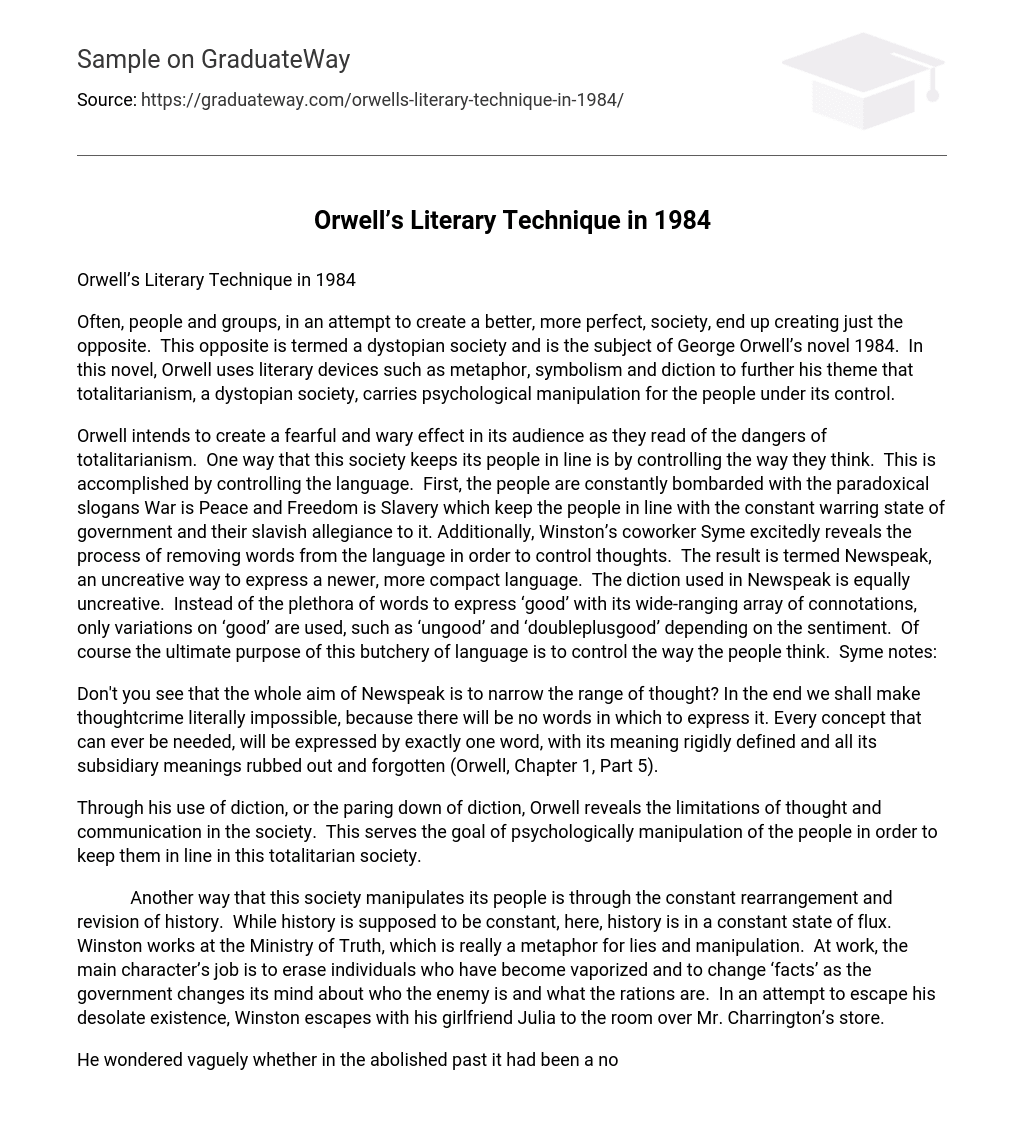Often, people and groups, in an attempt to create a better, more perfect, society, end up creating just the opposite. This opposite is termed a dystopian society and is the subject of George Orwell’s novel 1984. In this novel, Orwell uses literary devices such as metaphor, symbolism and diction to further his theme that totalitarianism, a dystopian society, carries psychological manipulation for the people under its control.
Orwell intends to create a fearful and wary effect in its audience as they read of the dangers of totalitarianism. One way that this society keeps its people in line is by controlling the way they think. This is accomplished by controlling the language. First, the people are constantly bombarded with the paradoxical slogans War is Peace and Freedom is Slavery which keep the people in line with the constant warring state of government and their slavish allegiance to it. Additionally, Winston’s coworker Syme excitedly reveals the process of removing words from the language in order to control thoughts. The result is termed Newspeak, an uncreative way to express a newer, more compact language. The diction used in Newspeak is equally uncreative. Instead of the plethora of words to express ‘good’ with its wide-ranging array of connotations, only variations on ‘good’ are used, such as ‘ungood’ and ‘doubleplusgood’ depending on the sentiment. Of course the ultimate purpose of this butchery of language is to control the way the people think. Syme notes:
Don’t you see that the whole aim of Newspeak is to narrow the range of thought? In the end we shall make thoughtcrime literally impossible, because there will be no words in which to express it. Every concept that can ever be needed, will be expressed by exactly one word, with its meaning rigidly defined and all its subsidiary meanings rubbed out and forgotten (Orwell, Chapter 1, Part 5).
Through his use of diction, or the paring down of diction, Orwell reveals the limitations of thought and communication in the society. This serves the goal of psychologically manipulation of the people in order to keep them in line in this totalitarian society.
Another way that this society manipulates its people is through the constant rearrangement and revision of history. While history is supposed to be constant, here, history is in a constant state of flux. Winston works at the Ministry of Truth, which is really a metaphor for lies and manipulation. At work, the main character’s job is to erase individuals who have become vaporized and to change ‘facts’ as the government changes its mind about who the enemy is and what the rations are. In an attempt to escape his desolate existence, Winston escapes with his girlfriend Julia to the room over Mr. Charrington’s store.
He wondered vaguely whether in the abolished past it had been a normal experience to lie in bed like this, in the cool of a summer evening, a man and a woman with no clothes on, making love when they chose, talking of what they chose, not feeling any compulsion to get up, simply lying there and listening to peaceful sounds outside. Surely there could never have been a time when that seemed ordinary? (Orwell, Ch 2, Part 4).
This room at first represents safety, happiness and joy to the couple, but it soon changes to terror as they are discovered and taken to the Ministry of Love. Here, paradoxically, people are tortured.
A final way in which people are manipulated into acquiescing to the demands of totalitarianism is the through the ever present symbols of the party. First, the people cannot miss the image of Big Brother, the symbolic representation of the party who is always “watching you”! This image is everywhere, impossible to miss. Secondly, the party discovers individual’s symbolic fears and uses them against them in the Ministry of Love. For example, rats represent to Winston the horrors of losing his mother. Therefore, the rats are the very thing which force Winston to give up his girlfriend and give up his own sensibilities. Further, the location which represents this ultimate fear is Room 101. Here everyone’s greatest fear comes to life. This is also apparent in the symbolic equation 2+2=5, which represents Winston’s final surrender to the party dictums. Winston’s justification for this can be found in the following: “Sanity was statistical. It was merely a question of learning to think as they thought” (Orwell Chapter 3, Pt. 4). When a rebel is finally reintegrated into society, he must mold to the party’s every thought. The author makes this horrifying reality apparent in Winston’s very last lines of the book: ‘But it was all right, everything was all right, the struggle was finished. He had won the victory over himself. He loved Big Brother.” Winston had succumbed.
Totalitarian societies still exist today. Many of them operate on the principles that Orwell reveals in 1984. His use of diction, metaphor and symbol further the idea that these societies control their citizens through psychological, even tortuous, manipulation. Only complete obedience is accepted and guaranteed because “Big Brother is Watching You!”





